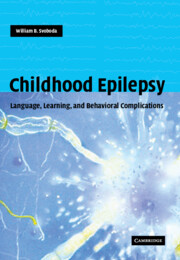Book contents
- Frontmatter
- Contents
- Preface
- Glossary
- 1 Looking ahead
- Part I Speech and language problems
- Part II Learning problems
- Part III Behavior problems
- 27 Mental health needs
- 28 Psychologic development
- 29 Seizure types and modifying factors
- 30 Overview: extrinsic factors
- 31 Behavior problems: general
- 32 Attention deficit disorders
- 33 Anxiety disorders
- 34 Mood disorders
- 35 Disruptive behavior problems
- 36 Psychoses of epilepsy
- 37 Non-epileptic events
- 38 Possible treatment issues
- 39 Helping with psychiatric problems
- 40 Epilog
- Index
- References
27 - Mental health needs
from Part III - Behavior problems
Published online by Cambridge University Press: 26 October 2009
- Frontmatter
- Contents
- Preface
- Glossary
- 1 Looking ahead
- Part I Speech and language problems
- Part II Learning problems
- Part III Behavior problems
- 27 Mental health needs
- 28 Psychologic development
- 29 Seizure types and modifying factors
- 30 Overview: extrinsic factors
- 31 Behavior problems: general
- 32 Attention deficit disorders
- 33 Anxiety disorders
- 34 Mood disorders
- 35 Disruptive behavior problems
- 36 Psychoses of epilepsy
- 37 Non-epileptic events
- 38 Possible treatment issues
- 39 Helping with psychiatric problems
- 40 Epilog
- Index
- References
Summary
About 30% of patients with epilepsy have some kind of psychiatric symptom (Onuma, 2000). The Federal Commission for the Control of Epilepsy and Its Consequences (1978) found that around 52% have major emotional problems. This surpasses the incidence seen in individuals with known brain damage, such as cerebral palsy. Help from mental health specialists knowledgeable about epilepsy is not readily available.
Epilepsy in children results in an increased risk for behavioral, emotional, psychiatric, and social impairments, occurring at a higher frequency than in people with other chronic illnesses, than in people who are visually or hearing handicapped, and much higher than in healthy children (Smith et al., 2002). Psychiatric disorders occur in 5–10% of the general pediatric population, 16% of those with chronic medical disorders, 29% of children with idiopathic epilepsy, and 58% of symptomatic epilepsy (Rutter et al., 1970; Connolly et al., 1984). This increased incidence is seen in both newly diagnosed and chronic epilepsy (Hoare, 1984). Various studies show that 21–27% of children with epilepsy have behavior disturbances. The frequency is increased if the epilepsy is complicated by other neurologic problems (Holdsworth & Whitmore, 1974; Mellor & Lowit, 1977). Teachers report a 21% incidence of deviant behaviors, such as aggressive, objectionable, truculent, spiteful, bullying, and attention-seeking behaviors (Holdsworth & Whitmore, 1974). Anxiety and depression a prominent in epileptic children with family functioning variables found to be influential (Ettinger et al., 1998).
- Type
- Chapter
- Information
- Childhood EpilepsyLanguage, Learning and Behavioural Complications, pp. 407 - 414Publisher: Cambridge University PressPrint publication year: 2004



